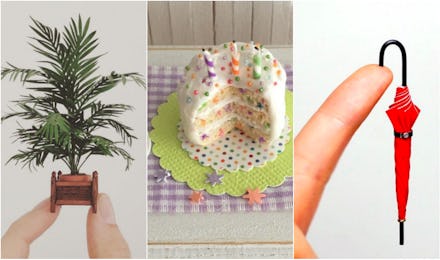Why Are We So Obsessed With Miniature Everything?

If you've scrolled through your social feeds recently, you may have seen a viral doughnut video that's gone viral. Watch as teensy Krispy Kremes are made by a Korean food blogger, the end product no larger than the size of a fingernail. The video has folks absolutely mesmerized and enamored with the adorableness of it at all.
But it's not just doughnuts. From micro-homes splashed all over cable TV to miniature enthusiasts creating tiny worlds online to the mini beauty products we stash in our carry-ons (forcibly, thanks to the TSA), there's an undeniable appeal to that which has been sized down and shrunken to a fraction of its normal size.
Take, for example, the Instagram account @tanaka_tatsuya, which creates vignettes of scenes in the most epic of teensy proportions.
Every day, photographer Tanaka Tatsuya posts a small scene to his nearly half-million followers (no small feat — pun unintended), with each photo racking up at least 25,000 double taps.
The "Mini Maker" Anna uses her Instagram account, @LittleThingsByAnna, for similar cuteness, recreating storefronts, breakfast spreads and bedrooms all in delicate bite-size proportions. Other accounts including @dailymini and @miminemini have also jumped on the mini bandwagon with food and still lifes, as has @architectureoftinydistinction with full-on homes.
But why we love minis so much is a recurring question and an especially curious one at that, considering humans seem to love minis in countless, seemingly unrelated forms — from the functional, like mini snack packs and mini toiletries, to the purely aesthetic, like these IG accounts.
Kelley Kitely, a mental health expert based in Chicago, cited the desire for control when it comes to these small things. "It can give you a sense of control when we're able to fit an entire scene into what feels like, the palm of our hands," Kitely said in a phone interview.
Read more: An Architect Is 3-D Printing This Enormous Estate Out of Dust, Sand and Gravel
In an interview with Vice, miniature artist Thomas Doyle explains his own satisfaction with small things. "The creation of small worlds gives us the illusion of control. In a world that grows ever more faster and chaotic, in a world in which we are bombarded with imagery, artworks in small scales allow us a place of retreat, where time has stopped," Doyle said.
Then there's the argument that miniature, in fact, should not be considered small but actually "right-sized," in response to our society's oversized tendency to supersize. That's the philosophy that Stowaway Cosmetics founders Chelsa Crowley and Julie Fredrickson had when they launched their line of portable products in 2014.
Fredrickson noticed she wasn't finishing any of the (generally expensive) beauty products she owned before she purchased new ones, since they were so massive. So the self-professed econ geek enlisted Crowley's makeup artistry to create their line of pint-sized makeup, designed to be used on the go without weighing you down. Two years later, the duo can't keep up with the demand as customers and investors alike have flocked to their idea of pared-down minimalism.
And it may just be that — the paring down of things — that is exactly why we're so obsessed with the tiny, controllable things. People "have so much more cognitive overload than we ever used to have," Fredrickson said, "and how much we consume and purchase can take a toll."
Kitely agreed, saying mini products feel "more manageable" in our big, busy, overwhelming lives. "Think about those 100-calorie packs," she said. "They're pricier, but they're doing the work for you; they're turning down that mental noise, that decision."
That small, miniature things help us feel in control extends to even the most fundamental of lifestyle items: homes.
Meredith Lerner, executive producer of FYI Network's Tiny House Hunting and Tiny House World, said in an email that "downsizing allows for more freedom and experiences, and means less maintenance and less time spent taking care of the things we own. For women in particular— many of whom are in charge of their households — I think downsizing strikes a chord because a tiny home means a more efficient home and less time spent on housework."
Fredrickson agrees, citing mobility as a huge issue, especially for millennials, as is control. "We're in such an age of anxiety," she said, "where there's just so much and everyone wants less."
If the obsession with minis should teach us anything, it's that smaller is simpler, and that tiny makes us feel powerful. In an age with so much going on, the ability to minimize anything and everything is optimal. Well, except maybe for doughnuts.